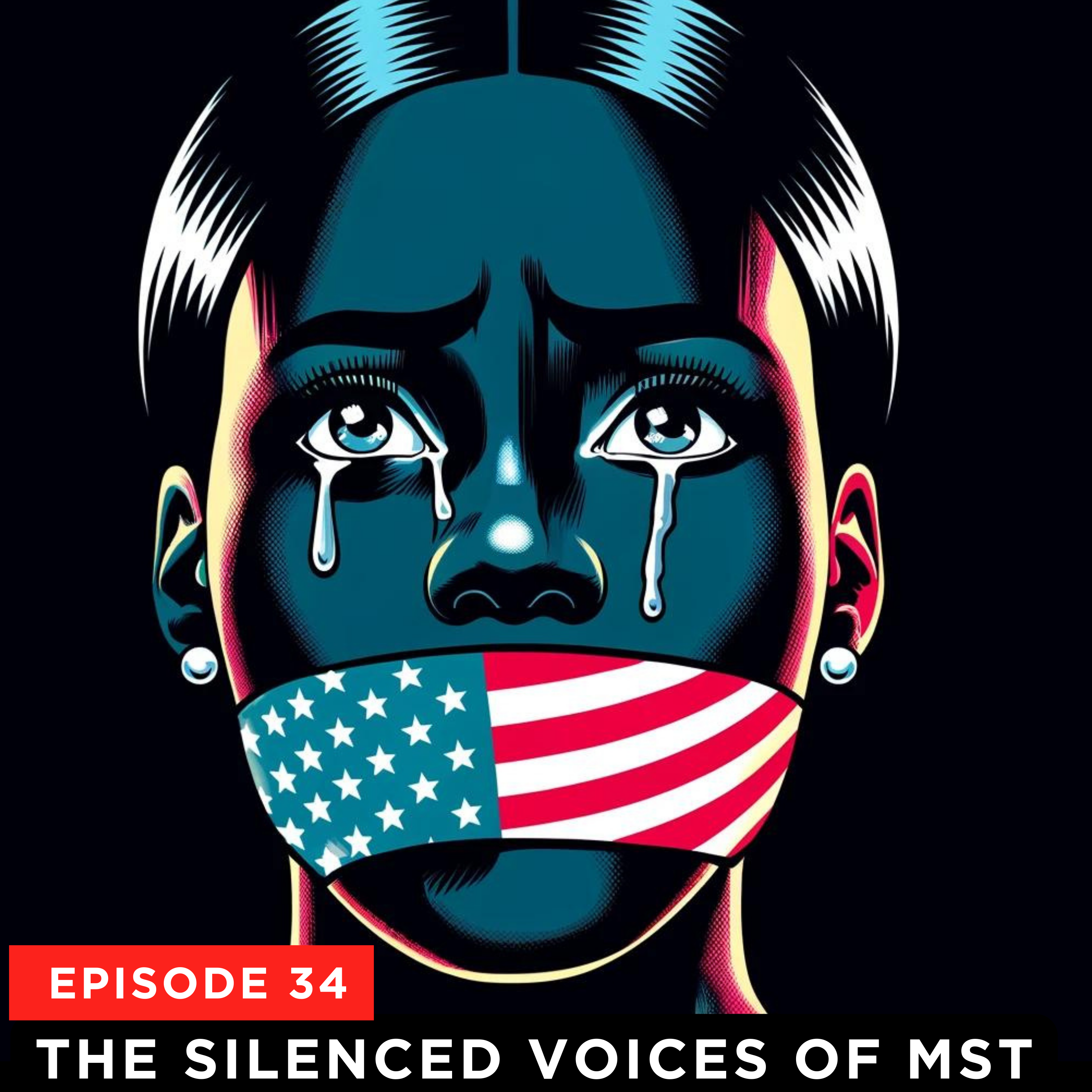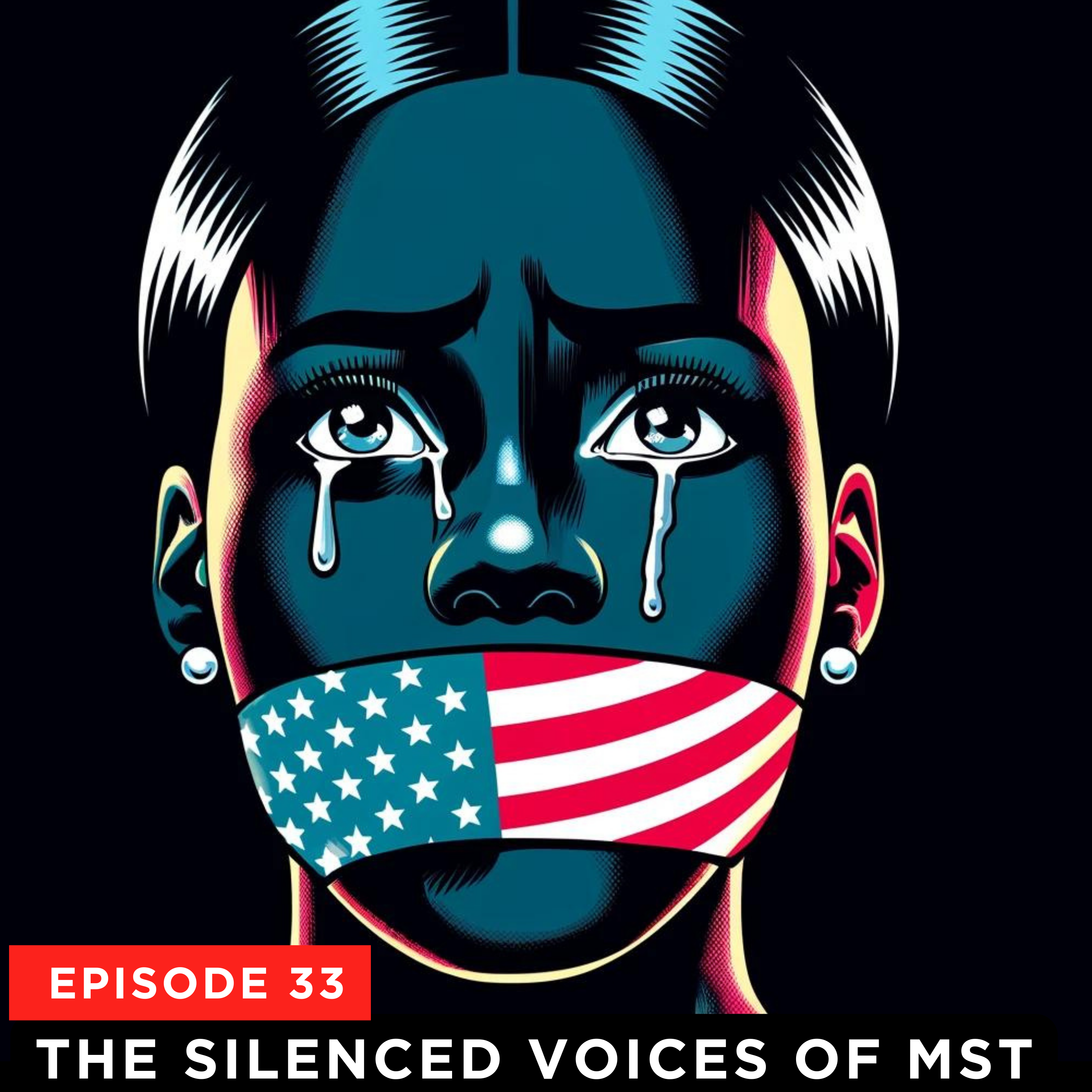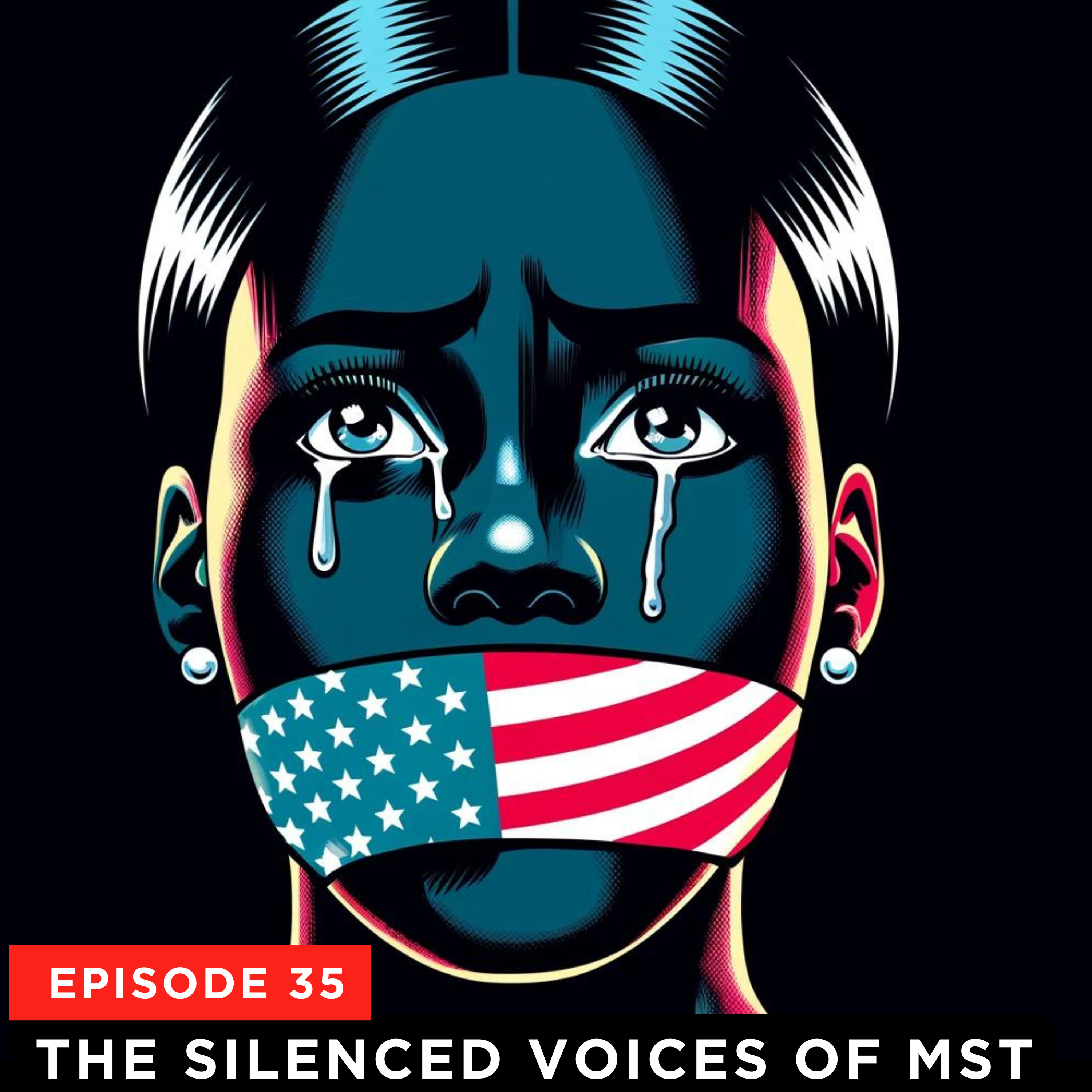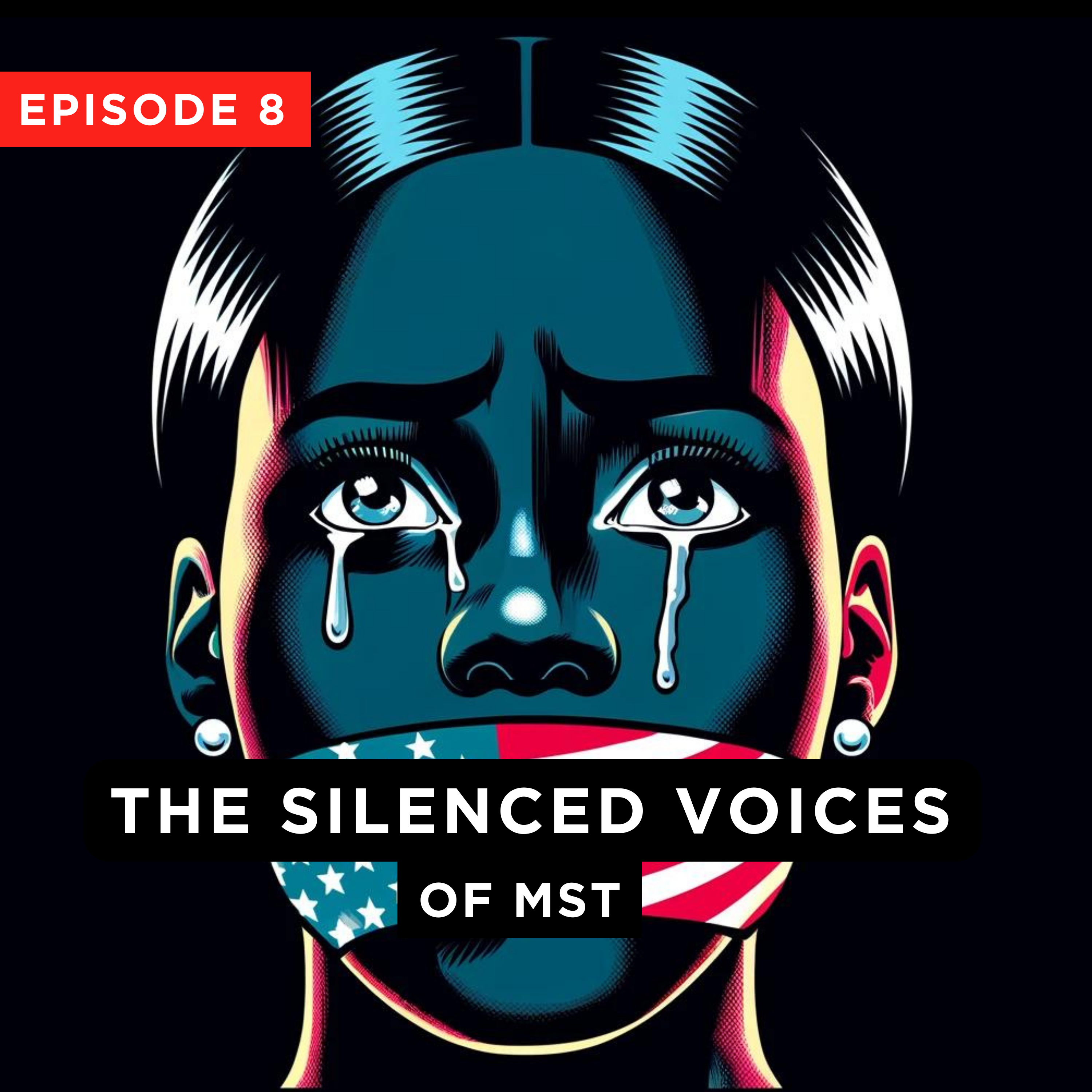Episode Transcript
[00:00:00] Speaker A: Misty has this really interesting story. She has come up with a way to fight back, which is incredible, especially when you've gone through the level of MST that she has. So here she is. And stick around to the end.
You can find a detailed list of the triggers in this episode in the description below.
[00:00:24] Speaker B: How does it feel knowing that you've given people this space?
[00:00:33] Speaker C: Well, I, I am honored every time somebody puts a marker. It's a huge honor to me.
Every single marker matters.
It's. It's a good feeling because, you know, I'm hoping it's a part of a healing journey and for some people it might be the start.
And I think that's a big deal.
[00:01:05] Speaker B: Yeah, that's very true. What was the URL for your website? So that our listeners and viewers can go see it and possibly leave a marker of their own.
[00:01:16] Speaker C: Mstmap.com Perfect.
[00:01:20] Speaker B: And I will have that in the show notes. You had mentioned that you had done a lot of learning and work surrounding your trauma.
Was there a particular coping skill that became maybe your go to if you felt like an episode of dissociation coming on or panic attack or something like that?
[00:01:42] Speaker C: Because I went so long without any knowledge or any help to be my go to was books.
I loved books. I just would read and read and read and read. And also I had pugs.
I love pug dogs because they have this, you know, really expressive face and they're cuddly and, you know, I take them for walks and get sunshine and little conversation with people.
So those were, you know, a lot of. That was probably the most helpful thing for those years where I was just kind of winging it, you know, pretending like nothing happened and yet, you know, not doing that well.
I just.
But meant a lot to me. And I mean, they were like self help books, the Bible, you know, there's this one book called Man's Search for Meaning. That's a really good one. And the Power of Positive Thinking. Just anything that was uplifting just really seemed to save me.
[00:02:58] Speaker B: It's on my reading list for next month, but it's the Untethered Soul. Have you read that one?
[00:03:04] Speaker C: No, we haven't.
[00:03:05] Speaker B: It's.
There's a horse on the front, but it is in that, that same vein of, I think radical self acceptance and like uplifting material and just kind of teaching you to let go. And I don't know if it's like, let go, let God or like let go and just embrace who you are. Maybe it might be through God, maybe not. I'm not sure because I haven't read it yet, but it Just incorporating those kinds of things into your day or maybe monthly, like I do, it's. They really can have quite the impact on you of just taking a moment for yourself to focus solely on positivity or solely on hope or. Or gratitude too. Gratitude's been a big thing.
[00:04:05] Speaker C: I have to admit. I'm a sucker for, like, positive memes. Oh yeah, I love them. The ones that teach you little things. And sometimes there's this. It's kind of overplayed, but it says, I don't know, who needs to hear this, but blah, blah, blah.
I love those.
[00:04:22] Speaker B: Those are good ones. Definitely. When they're like.
And it could be something as simple as that. One thing you heard in third grade doesn't have to define you.
[00:04:33] Speaker C: Right. Exactly. I mean, they're just little words of wisdom and I think it's great.
[00:04:40] Speaker B: It's important. How many of us never heard those things growing up, or maybe we went through a lot in our more formative adult years, so you never really had time to internalize those kinds of positive things. So for some people, they might be brainers, but for us they're like, yeah.
[00:05:01] Speaker C: And sometimes maybe you've heard something many times, but then just, just one time where it really hits you.
[00:05:09] Speaker B: Yeah.
[00:05:09] Speaker C: In a new way. And it's like, wow, just ready to hear it yet.
[00:05:14] Speaker B: Until that time, I completely understand.
[00:05:18] Speaker A: Don't forget, you can leave Misty a.
[00:05:20] Speaker B: Message@Silence VoicesMST.com have the website, but I do also want to share any other ways that people can find support from other survivors that may have participated in the site. Like you have Facebook, Instagram, one of those.
[00:05:38] Speaker C: So I do have a Facebook page and it's. The name is MST News & Info. And with that, I'm more of a curator than a creator, but I'm presenting current news stories and little helpful articles about daily life with mst.
And I also have an Instagram that's Misty Days, because I had like 15,000 days with MST a lot. So to me, it's so important to. To realize that MST is impacting us every single day in little ways. And it's so easy to forget that. And so that's the aim behind.
I mean, I do talk about the website a little bit, but I also have a passion for daily living with MST because it's very important that we keep focused on healing, even if it's a little bit. Even if we just keep certain ideas in our mind and what matters, what Makes a difference.
So that's the aim behind my Facebook page and my Instagram.
[00:06:56] Speaker B: Wonderful. That is so important because you have some days are good, some days not so much. So it's important to know how to live those days and every day in between. So I get it.
[00:07:09] Speaker C: The days add up.
[00:07:11] Speaker B: Yeah, they do. And I will put the links to that in the show notes as well so followers can find you and get some inspiration. And hey, more resources never hurt anybody, you know, that's true.
[00:07:26] Speaker C: I mean, I love social media for that reason. It just keeps me, I feel, you know, connected to other people with MST and ideas and the latest information.
I think it's all the pages and websites are wonderful.
[00:07:44] Speaker B: What advice would you give someone that maybe. Well, we'll have the question two ways. So if someone is struggling currently with harassment or bullying in the form of, you know, someone forming an opinion about them and then creating a whole weighted. Try to destroy them internally, what would you say to that young person that's currently serving?
[00:08:15] Speaker C: That's a hard one because it's happening. It's so true.
You know, like units can really just pick on somebody and beat them up and be so hurtful. And I think if you're. It's situational, if you're in a unit like that, try and get out, you know, see a chaplain, just do things, do what you can to get out of that unit if it's so bad. Because sometimes they can be that bad.
[00:08:52] Speaker B: I mean, there's the exclusion. There's so much that like they have the click. So if you're not in it and you are somehow on the outside in a negative way, then I guess a.
[00:09:08] Speaker A: Rat pretty much, yeah.
[00:09:10] Speaker C: And that can be amazingly hurtful, especially if somebody's feeling sensitive. And there's times in your life that you can take things better than other times if they needed to get out of the unit. And if it's not that bad, just find good people to hang out with. People that are focused on their future, they're doing good things, and just forget about the negative people and just stick with the positive.
If there's one good person to be around, be around that person.
I mean, it can be pretty simple to just. The thing is, I think our. It's easy for our thinking to get in a rut and sometimes it's answer, it's pretty simple, you know, just stay away from the idiot, the bad people and find good people.
Hopefully that's doable.
[00:10:09] Speaker B: And the, the second part of the question is for someone that maybe they had A similar trauma happen in their early career and they just tried to bury it. And maybe now they're just, maybe they left a marker on your website, for example, and they're just beginning to come to terms with and start their healing journey. Any words of wisdom or advice for them?
[00:10:38] Speaker C: Well, I, I believe that we are so blessed with an abundance of information, an abundance of Facebook groups, Reddit, YouTube, TikTok. Just start learning about it and it will help you and you can find support and just start the journey. These days you don't have to start it alone. You can find a community with any keyboard on your phone, on your desktop, whatever that really matters a lot. Us old folks who just had ourselves, we had nobody to consult, we had nothing to look at and I think we felt so alone. It really is a blessing to have so much at your fingertips and that's a blessing. And you know, I think your website is a huge blessing. I hope the map is a blessing and I hope it's just the beginning. And I think one problem is people can feel like they don't have the energy or the time. Because I was like that for many, many years. I just thought, I have no room for that right now. But I can tell you and share with your viewers and listeners that as a 60 year old that it has taken its toll. And my body, I'm in pain every day because I have inflammation. My muscles have been so tight for so many years that I, you know, it's physically impacted me and I have, you'll see if you study about it, if you don't, if you don't take care of this when you're younger. I have a little bit of, hopefully it's a little bit of cognitive decline. I mean, I forget words and it's in there. Talking about little memes. That's one of the memes. If you don't take care of this, you know, you will have physical impact.
And so it's important, make time for it today.
And I didn't do that and I am paying the price. So it is very important.
And it may seem like you don't have time, don't, don't put it off, just take care of it, do what you have to do, heal.
[00:13:04] Speaker B: I think that is excellent advice. And yeah, that stuff, trauma has a way of changing your DNA and you can actually pass it on to your children just through maybe you haven't developed healthy coping skills that those things transfer to kids. So it is definitely best to put your emotional wellness and mental health and physical health at the top of your priority list because it's so hard to get those things back once they're starting to break.
[00:13:46] Speaker C: Right. And because I had my kids, they're in their 30s. I'm figuring out I have MST. I was figuring it out while they're in their 30s and when they were young, one way trauma manifested in me is I just had such a hard time mentally being there for them and.
And I kind of just thought I was bored or whatever. No, I just couldn't be there. My mind was always somewhere else. And. And I hate that. I hate that so much that I wasn't 100% there for my sons for their whole lives. And, you know, that is one of the biggest regrets. So it is important to learn all the ways that MST impacts us and how it impacts the people we love. It's really a big deal to learn about it and take the time to see all the ways that it impacts us.
[00:14:48] Speaker B: I agree.
Is there anyone that you would like to shout out or thank for maybe.
Maybe helping you see a blind spot or realizing, okay, it's time for me to focus on myself and take some of the advice that you just gave?
[00:15:07] Speaker C: My heroes are those people that had the courage to love me and to see value in me. Because, yeah, there's been people that think, oh, there's something a little off, and they just snub you, but then there's people that still care about you. I had a military best friend, and she knew I was a mess, but she hung out with me anyway. And a lot of times, she showed me an example, you know, through example, better ways to deal with, you know, situations.
[00:15:42] Speaker B: Yeah.
[00:15:43] Speaker C: And then later, in my civilian job, I had a best friend, and she listened endlessly to my woes as I would mess one thing up or after another, and she just tirelessly listened to me. I mean, she was tireless. It was very wonderful. And for my husband, he loves me fearlessly, and. And it's so nice to. Because I went without that for a very, very long time and sometimes worry about being the way I am. And he says, I ain't scared. And every time he says that, I just. I love it and it means the world to me.
[00:16:26] Speaker B: So I'm, like, tearing up.
[00:16:32] Speaker C: So I think those people, they're the best. They just, you know.
[00:16:40] Speaker B: Oh, that is so wonderful. And I think that is such a positive note to end the episode. Episode on. So, I'm sorry, I'm a little choked up. But, Misty, thank you so much for joining us and sharing your story. And just having the wherewithal to create this amazing website to give people another way to tell their story and feel seen and heard.
[00:17:07] Speaker C: I want to say thank you for everything that you're doing and I'm going to listen to every single podcast. I've listened to many of them, but I haven't had the chance to listen to all of them. But you are wonderful and you're bringing something that's very needed and, you know, humanizing once again, humanizing mst.
And thank you. Thank you.
[00:17:35] Speaker B: Okay.
[00:17:35] Speaker A: I mean, yeah.
I did not expect that when I had reached out to her about the website and how she developed it and all of that. It is incredible. And I recently learned that in 2020, the Supreme Court made it so certain cases of MST don't have a statute of limitations. That includes rape, some sexual assaults. I'll link the information below in this post. But the beauty of Misty's map, like she explained in the episode, is that the more pins, the more the more a pattern can be established to really isolate. This person was stationed in this area at this time, and there's six assaults. I'm sure you see the potential with that, especially with recruiters. So in the episode, we did mention a few of them that really abused their positions of power with people that never even ended up joining the military. So they're not typically counted in MST statistics. If you could please leave a review on Apple Podcasts or wherever you get your podcast that goes toward helping these stories get visibility. And visibility is how we get accountability. And remember, your voice is the weapon in the fight against mst. Take care.
[00:18:47] Speaker B: Bye.




